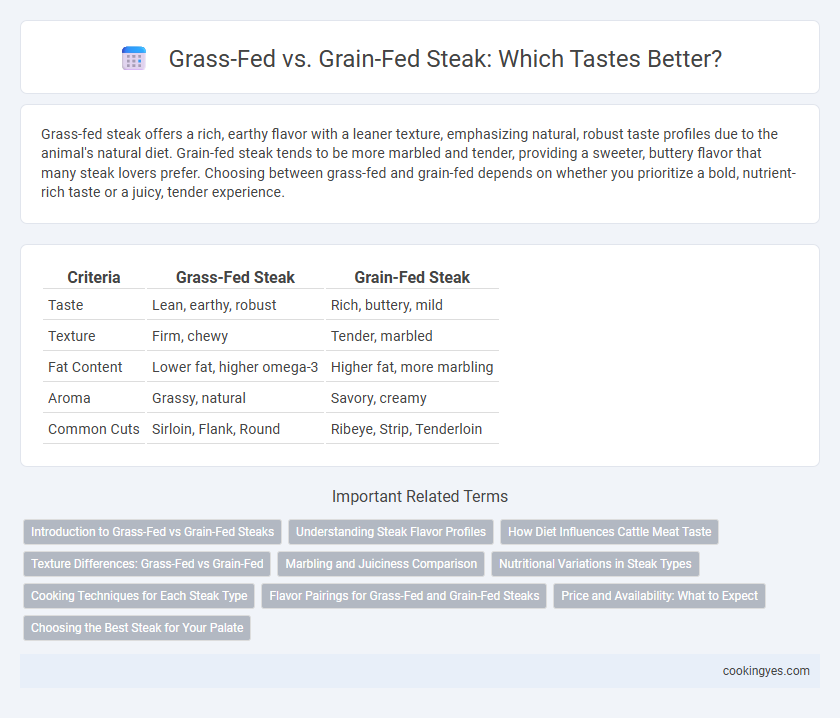Grass-fed steak offers a rich, earthy flavor with a leaner texture, emphasizing natural, robust taste profiles due to the animal's natural diet. Grain-fed steak tends to be more marbled and tender, providing a sweeter, buttery flavor that many steak lovers prefer. Choosing between grass-fed and grain-fed depends on whether you prioritize a bold, nutrient-rich taste or a juicy, tender experience.
Table of Comparison
| Criteria | Grass-Fed Steak | Grain-Fed Steak |
|---|---|---|
| Taste | Lean, earthy, robust | Rich, buttery, mild |
| Texture | Firm, chewy | Tender, marbled |
| Fat Content | Lower fat, higher omega-3 | Higher fat, more marbling |
| Aroma | Grassy, natural | Savory, creamy |
| Common Cuts | Sirloin, Flank, Round | Ribeye, Strip, Tenderloin |
Introduction to Grass-Fed vs Grain-Fed Steaks
Grass-fed steaks come from cattle that graze on natural pastures, resulting in leaner meat with a distinctive, earthy flavor and higher omega-3 fatty acids. Grain-fed steaks are raised on a diet of corn or other grains, producing marbled beef with a richer, buttery taste and tender texture due to increased intramuscular fat. Understanding these differences helps steak enthusiasts choose between the robust, nutrient-dense grass-fed option and the more flavorful, tender grain-fed alternative.
Understanding Steak Flavor Profiles
Grass-fed steak offers a robust, earthy flavor with a leaner texture, influenced by the natural diet of pasture grasses rich in omega-3 fatty acids. Grain-fed steak delivers a buttery, richer taste with increased marbling and tenderness, due to a high-energy corn and soy-based diet promoting higher intramuscular fat. Understanding these distinct flavor profiles helps steak enthusiasts select cuts that best suit their preference for either bold, natural tastes or smooth, well-marbled textures.
How Diet Influences Cattle Meat Taste
Grass-fed steak boasts a richer, earthier flavor profile due to higher levels of omega-3 fatty acids and antioxidants found in pasture plants, while grain-fed beef tends to be more marbled and buttery with higher intramuscular fat content. The cattle's diet directly influences the fat composition and tenderness of the meat, with grass-fed steaks often exhibiting a leaner texture and slightly gamey, robust taste compared to the sweeter, milder flavor of grain-fed beef. Understanding these dietary impacts helps consumers select steak based on flavor preference and nutritional benefits.
Texture Differences: Grass-Fed vs Grain-Fed
Grass-fed steak offers a leaner texture with a firmer bite due to lower fat content and more muscle development. Grain-fed steak typically presents a more tender and buttery texture, attributed to higher marbling and intramuscular fat. Texture differences significantly influence cooking methods and overall eating experience for steak enthusiasts.
Marbling and Juiciness Comparison
Grass-fed steak typically offers leaner meat with less marbling, resulting in a firmer texture and a more pronounced, earthy flavor profile. Grain-fed steak boasts higher intramuscular fat, enhancing marbling which directly correlates with increased juiciness and tenderness. The elevated marbling in grain-fed beef contributes to a richer mouthfeel and a buttery taste, often preferred by steak enthusiasts seeking maximum flavor and succulence.
Nutritional Variations in Steak Types
Grass-fed steak contains higher levels of omega-3 fatty acids, antioxidants, and vitamins A and E compared to grain-fed steak, offering a leaner and more nutrient-dense profile. Grain-fed steak typically has greater marbling and fat content, resulting in a richer, buttery flavor but with higher saturated fat levels. These nutritional differences influence both the taste and health benefits, making grass-fed steak a popular choice for those seeking a more natural and heart-healthy option.
Cooking Techniques for Each Steak Type
Grass-fed steak benefits from quick, high-heat cooking methods such as grilling or pan-searing to preserve its lean texture and enhance its naturally robust, earthy flavor. Grain-fed steak, with its higher marbling, performs well under slower cooking techniques like reverse searing or sous vide, which allow fat to melt and intensify the meat's buttery, rich taste. Understanding the fat content and muscle structure of each type guides optimal heat application to maximize tenderness and flavor complexity.
Flavor Pairings for Grass-Fed and Grain-Fed Steaks
Grass-fed steaks offer a robust, earthy flavor profile that pairs exceptionally well with herbaceous seasonings like rosemary, thyme, and garlic, as well as bold accompaniments such as blue cheese and red wine reductions. Grain-fed steaks feature a richer, buttery taste enhanced by sweet and savory pairings including caramelized onions, mushrooms, and sauces made from balsamic vinegar or creamy peppercorn mustards. Choosing flavor pairings that complement the natural marbling and fat content of grain-fed beef or the lean, complex notes of grass-fed beef maximizes the overall steak dining experience.
Price and Availability: What to Expect
Grass-fed steak generally commands a higher price due to its longer feeding periods and limited supply, appealing to consumers seeking leaner meat with distinct flavor profiles. Grain-fed steak is more widely available and typically less expensive, benefiting from faster cattle growth and higher fat marbling, which enhances tenderness and juiciness. Consumers choosing between grass-fed and grain-fed can expect premium pricing and niche availability for the former, while the latter offers affordability and broader market presence.
Choosing the Best Steak for Your Palate
Grass-fed steak offers a leaner texture with a robust, earthy flavor that appeals to those seeking a more natural and complex taste profile. Grain-fed steak provides a richer, buttery flavor with higher marbling, resulting in a tender, juicy bite preferred by lovers of classic, savory beef. Choosing the best steak depends on your palate's preference for flavor intensity and texture, with grass-fed emphasizing purity and grain-fed highlighting indulgence.
Grass-Fed vs Grain-Fed for steak taste Infographic

 cookingyes.com
cookingyes.com